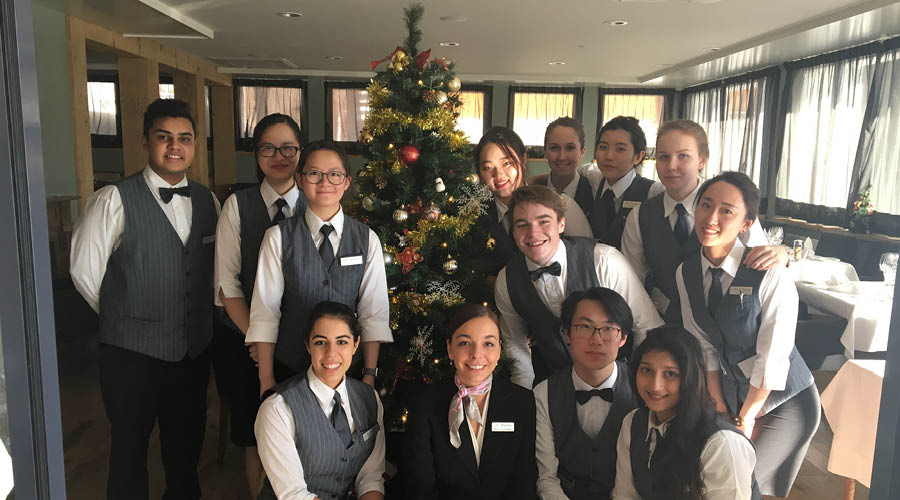What can you do with a hospitality management degree?
27th June, 2022


Lets Get Started
Start your journey to Les Roches by downloading our interactive brochure for an indepth look at our school
DownloadWhat is a hospitality degree?
These academic programs are designed to prepare students for careers in hospitality management. They cover essential topics such as hotel operations, food and beverage management, hotel administration, event planning and tourism marketing.
Offered at associate, bachelor’s, and master’s levels, hospitality degrees provide a blend of theoretical knowledge and practical experience through internships, seminars, and hands-on projects. With a focus on experiential learning and industry connections, hospitality management graduates are equipped with the skills and expertise needed for successful careers in hospitality, event management, tourism and related fields.
Hospitality business degrees teach soft skills
With a hospitality business degree, you’ll be primed for leadership success in any industry. You’ll learn all the essential, transferable skills that a great international business degree provides — marketing, human resources, and finance — with added benefits. As a hospitality business graduate, you’ll also gain prized soft skills that are highly sought after.
Good hospitality business degrees take you out of the classroom
Employers want new hires who can jump straight in, so they really value practical work experience.
With a hospitality business degree, you’ll get the unique opportunity to travel and learn from doing. You’ll be taught practical skills in real-world environments; skills that can’t be learned by reading books. You’ll learn how to work under pressure, manage people, problem-solve, and pay attention to the details.
When it comes to landing your first job, this hands-on, real-life experience will give you a head start on traditional business graduates.
Is a Bachelor in Hospitality right for you?
Do you have big dreams and even bigger plans? Our BBA in Global Hospitality Management might be for you. See your match our 4-minute quiz
Take Quiz
What can you do with a hospitality management degree? Jobs you can aim for:
A hospitality degree gives you the theoretical know-how you can apply across many different industries, including hospitality management. This, coupled with on-the-job soft skills and customer service experience, means you’re ready to step straight into a job once you’ve graduated.

Traditional hospitality careers
There are plenty of hospitality careers that your degree could open up for you. From steering hotel operations to orchestrating unforgettable travel experiences. These roles are perfect for professionals looking to lead, innovate, and create unforgettable guest experiences.
Careers in hotel management
This includes roles such as general hotel manager, front office manager, housekeeping manager, and food and beverage manager. These professionals oversee various aspects of hotel operations, ensuring guest satisfaction, managing staff, and maximizing profitability.
Travel and tourism management
Careers in the travel and tourism industry include positions such as travel agent or agency manager, tour operations manager, destination manager, and tourism marketing director. These professionals lead teams, develop strategies, and oversee operations to ensure seamless travel experiences for clients and guests.
Food and beverage (F&B) management
F&B management roles include restaurant manager, executive chef, bar manager, and catering director. These professionals are responsible for managing the culinary and beverage operations of restaurants, hotels, catering companies, and other hospitality establishments, ensuring quality service and financial success.
Resort management
This could mean being a resort general manager, activities director, spa manager, or recreation manager. These professionals oversee all aspects of resort operations, including accommodations, dining, recreational activities, and guest services, to create exceptional guest experiences and drive profitability.
Event management
If you like special events, you could consider positions such as event planner, conference services manager, wedding coordinator, and convention manager. These professionals plan and execute a wide range of events, from corporate meetings and conferences to weddings, parties, and special occasions, ensuring flawless execution and guest satisfaction.
Front office management
Roles such as front office manager and hotel services manager oversee front desk operations, reservations, and guest services. They ensure smooth check-in and check-out processes, handle guest inquiries and requests, and maintain high levels of guest satisfaction.
Careers outside of traditional hospitality industries
By covering the same academic theory as any traditional international business degree, a hospitality business degree offers you limitless opportunities across a big range of non-traditional hospitality sectors, too.
Soft skills, customer service, and real-world exposure (gained through internships and placements) are top priorities for modern, dynamic businesses. A hospitality business degree sets you up as a top candidate for potential employers.
Here are some examples of more non-traditional hospitality careers:
Finance & Investment
Hospitality professionals interested in finance have countless career options available in this industry, where quality customer service is highly valued. This might include working in wealth management, advising affluent clients on how to manage their finances; or finance and investment, devising strategies for handling financial assets, banking, and tax services.
Some career opportunities you could aim for in financial management include:
- Financial analyst
- Financial planner/advisor
- Portfolio manager
- Risk analyst/manager
- Corporate finance manager
Sports
A role in sports management covers a variety of operations. This could include guest services, such as guest relations and logistics for important club patrons and VIPs; or planning and management of major global events such as the UEFA European Championship, Wimbledon, Formula 1, or the Commonwealth Games.
Some roles in sports management that you could look at are:
- Sports agent
- Sports marketing manager
- Athletic director
- Sponsorship coordinator
- Stadium operations manager

Real Estate
As a real estate professional, you might be an estate agent, broker, or real estate manager. You might oversee a client’s portfolio of commercial properties or handle the logistics and promotional activities required for selling a house. Promoting yourself, and your client’s properties, and providing top-quality customer service are all key in real estate.
If you are considering a career in real estate, some roles suitable for people with hospitality degrees include:
- Real estate agent/broker
- Property manager
- Real estate developer
- Real estate investment analyst
- Leasing agent
Customer relations
Customer relations is all about building positive and trusting relationships with customers and clients. As a customer relationship manager, you’ll be in charge of building and maintaining profitable relationships, resolving complaints, expanding the customer base, and strategizing how best to compete with rival brands.
With the experience of handling customers from a hospitality degree, you might be suitable for roles such as:
- Customer experience manager
- Client relationship manager
- Customer service supervisor
- Customer success manager
Complaints manager: Handle escalated customer complaints and issues, working to resolve them efficiently and satisfactorily while identifying opportunities for improvement.
Marketing and Brand Management
A role in marketing or brand management focuses on successfully promoting a company’s products or services. As a manager, you might be tasked with analyzing brand positioning and consumer insights, managing marketing campaigns, or devising go-to-market strategies.
Within marketing and brand management there are various roles that would suit you after obtaining a hospitalit degree, such as:
- Brand manager
- Marketing coordinator
- Product manager
- Market research analyst
- Social media manager

Luxury
Luxury brands offer unique, premium experiences and outstanding personal service to promote a high-quality, expensive image. Working in luxury brand management could see you working in diverse industries from cars to wine, spa resorts to fashion. You might lead the creative process for a product, manage marketing campaigns, or analyze pricing and profitability.
Some roles in the field of luxury services and products include:
- Luxury brand manager
- Luxury retail manager
- Luxury sales director
- Luxury travel advisor
Luxury concierge services director: Oversee the provision of personalized concierge services to high-net-worth individuals, coordinating exclusive experiences, reservations, and VIP treatment.
Management consulting
As a management consultant, you’ll provide expert advice and solutions to businesses to improve their performance and profitability. You’ll have opportunities to work across different industries, particularly those with a focus on customer experience, where hospitality business management skills are very valuable.
Some examples of roles that you could consider in management consultancy are:
- Management consultant
- Business analyst
- Strategy consultant
- Change management consultant
- Technology consultant

Entrepreneurship
Do you dream of running your own business? Whether it’s a hotel chain, nightclub, or restaurant, a bachelor’s degree in hospitality will help you gain all the knowledge and experience needed to take the exciting step of establishing your own hospitality business.
Within entrepreneurship, there are options such as:
- Startup founder/CEO
- Small business owner
- Social entrepreneur
- Franchise owner
- E-commerce entrepreneur
Learn more about a career in hospitality

Industry News

Industry News

Industry News

Hospitality Careers
Hospitality business degrees teach soft skills desired by businesses across industries
With a hospitality business degree, you’ll be primed for leadership success in any industry. You’ll learn all the essential, transferable skills that a great international business degree provides — marketing, human resources, and finance — with added benefits. As a hospitality business graduate, you’ll also gain prized soft skills that are highly sought after in all roles, from tourism officers to directors of cruise ships.
Some of the most valuable soft skills taught in hospitality management programs are:
- Communication skills: this is essential in the hospitality industry for interacting with guests, colleagues, and management. This includes verbal communication, written communication, and active listening.
- Customer service skills: hospitality management programs emphasize the importance of providing exceptional customer service. Students learn how to anticipate and meet the needs of guests, handle complaints professionally, and create positive experiences.
- Interpersonal skills: building rapport and fostering positive relationships with guests and colleagues are crucial in hospitality. Students with these people skills know how to work effectively in teams, resolve conflicts, and collaborate with diverse groups of people.
- Leadership skills: hospitality management degrees often include courses on leadership and management principles. Students learn how to motivate and inspire teams, delegate tasks effectively, and lead by example.
- Problem-solving skills: the hospitality industry presents a variety of challenges, and students learn how to think critically and creatively to solve problems as they arise. This includes troubleshooting issues with reservations, service disruptions, and guest complaints.
- Time management: planning and managing time efficiently is essential in hospitality, where schedules are often tight and deadlines must be met. Students learn how to prioritize tasks, delegate responsibilities, and maintain productivity.
- Adaptability: the hospitality industry is dynamic and constantly evolving, so students learn how to adapt to changes quickly. This includes being flexible with schedules, adjusting to new procedures, and staying current with industry trends.
- Cultural sensitivity: hospitality degrees emphasize the importance of cultural awareness and sensitivity when interacting with guests from diverse backgrounds. Students learn how to respect cultural differences and adapt their approach accordingly.
- Emotional intelligence: understanding and managing emotions is essential in hospitality, where interactions with guests can be emotionally charged. Students learn how to empathize with others, manage stress effectively, and maintain professionalism in challenging situations.
- Attention to detail: in hospitality, even small details can make a big difference in guest satisfaction. Students learn how to pay attention to detail in areas such as cleanliness, presentation, and service delivery.
- Organizational skills: these are vital to help you manage a team and ensure that all projects get handled well and on time.
Of course, all of these skills can be applied to any area of work, making them highly valuable. These can help give you a head start in any field you choose.
Employers want new hires who can jump straight in, so they really value practical work experience. With a hospitality business degree, you’ll get the unique opportunity to travel and learn from doing. You’ll be taught practical skills in real-world environments; skills that can’t be learned by reading books. You’ll learn how to work under pressure, manage people, problem-solve, and pay attention to the details.
When it comes to landing your first job, this hands-on experience will give you a head start on traditional business graduates. For example, the internships in a Les Roches hospitality degree will help you build on these skills and get experience in a leadership role, which you will not often get without working up through other roles. You will be able to find an internship that suits your dreams best. For example, you might want an internship working in a food and beverage department to help you get jobs in restaurant management or to help build the skills to open your own business in the food industry.
Is a hospitality degree worth it?
A hospitality degree can fast-track you to a successful career in business with top-tier brands. You’ll gain a whole host of benefits from a hospitality business degree program, including:
- Academic business content that’s applicable across diverse sectors
- Invaluable real-world exposure through internships
- Sought after soft skills gained through practical learning
- Exciting opportunities to travel the world with global internships and study at international campuses

The best hospitality schools offer you career advantages you won’t get from simply working your way up, such as:
- Exclusive partnerships with world-famous companies that actively recruit students for internships and permanent roles
- Networking opportunities to help you further your career. You can use this kind of support even after you have graduated.
- Alumni communities that offer life-long support with other people in the field and other graduates
The Les Roches network includes some of the most famous and high-end hospitality companies, as well as recruiters and experts in the field. All of this helps make sure that you have the support you need to get the kind of career you want.
Become a leader in hospitality
Study for a Bachelor’s in hospitality management to open up a world of opportunities at a leading industry school.
Bachelor’s degree in hospitality management
What kind of accreditation should my degree program have?
Look for accreditations from a reputable industry body like the New England Commission of Higher Education (NECHE). Members of this voluntary association achieve accreditation by adhering to the highest quality standards of educational excellence.

Hospitality business degrees are the perfect choice if you want to keep your options open
Still not quite sure what you want to do? A hospitality business degree provides essential business knowledge that’s transferable across industries. This lets you keep your options open: you don’t have to decide now or focus on one particular niche for life – enjoy flexibility throughout the course of your career.
By combining soft skills and real-world exposure through internships and practical projects, a hospitality business degree has a definite edge over other, traditional business degrees.
So, if you’re looking for a hospitality business degree that keeps your options open and sets you up for a hospitality career or further afield, take a look at our Bachelor in Hospitality Management.


